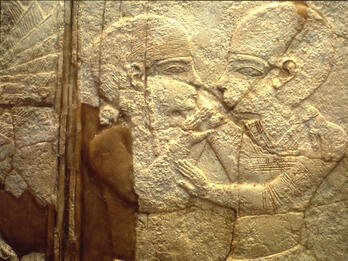Praise the Lord for He is Good
Psalm 136
Biblical Period
This psalm is constructed on the Torah narratives about the creation, the Exodus, and the passage through the wilderness en route to the Promised Land—God’s most important and impressive acts, for which He is deserving of praise. It ends with words of encouragement that even in times of trouble—that is, destruction and exile—God will continue to protect and care for Israel as He did when they first became a nation. Each major divine act is accomplished through several steps, and each step is usually expressed in two- or three-line parallelism. For instance, creation (verses 5–9) begins with the heavens and the earth (verses 5–6) and then moves to the celestial lights (verses 7–9). The refrain, “His steadfast love is eternal,” which may have been recited by the congregation, is inserted after each line, interrupting the parallelism. This structure lets the congregation acknowledge that each discrete element of God’s actions—indeed, each line within the parallelism—is proof of God’s steadfast love. Through this multilayered structure the poet has provided multiple opportunities to praise God.
Related Guide
Biblical Poetry
Biblical poetry is characterized by short parallel lines, without a fixed meter or rhyming pattern, and include love poems, laments over the dead, victory poems, and laments, among others.
You may also like

The Song of Songs



